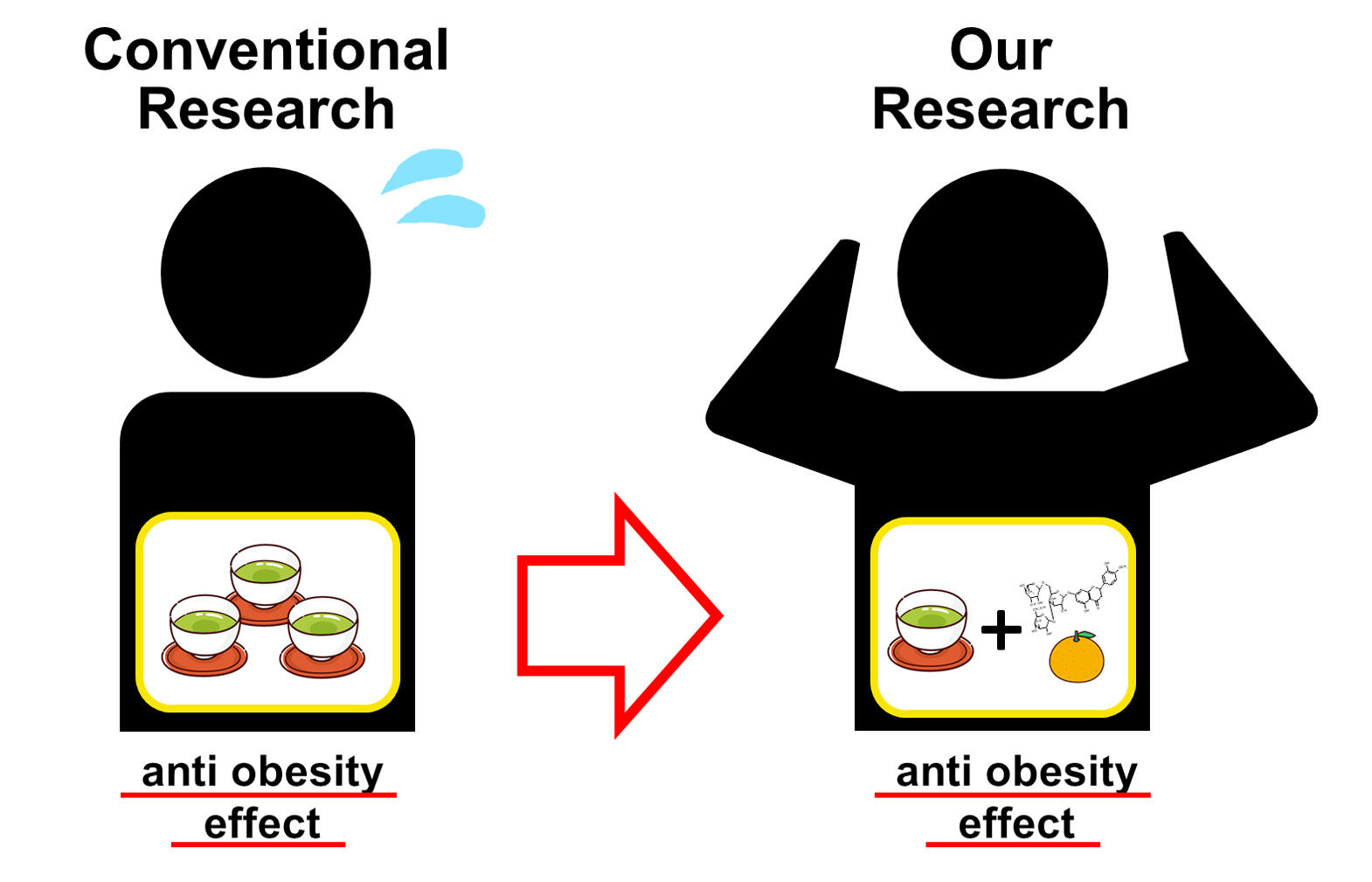Green tea is known to exert an anti-obesity effect when consumed; however, to obtain such effect, one must drink bitter tea that contains high levels of catechins. However, it is possible that the anti-obesity effect might be achieved with a less bitter taste when the tea is consumed with citrus fruits. In a joint study with the Toyota Motor Corporation a research group comprising Professor Hirofumi Tachibana of Kyushu University Graduate School of Agriculture, and Jun Nishihira of Hokkaido Information University revealed, through a human interventional study, that citrus-derived polyphenols enhance the anti-obesity effect of green tea. An intervention study was conducted for 12 weeks with 60 healthy Japanese men and women between 30 and 75 years. The combined consumption of green tea and citrus-derived polyphenols resulted in an anti-obesity effect when an amount of green tea catechins, less than is conventionally consumed with just green tea, was consumed. Owing to these findings, not only the development of foods that induce anti-obesity action, but also the study of food pairing is expected to follow. These findings were published online in Scientific Reports.
Japanese food, which is composed of various ingredients, is thought to contribute to the longevity of the Japanese population; however, the bioregulatory function of the combination of various food ingredients in Japanese food is not fully understood. The human body is equipped with a mechanism to sense ingested food ingredients, and these play an important role in the bioregulatory function of the body. EGCG, a type of green tea catechin responsible for the bioregulatory function of green tea, is known to excert various physiological effects through being sensed at the cell-surface by the 67-kDa laminin receptor (67LR). Professor Tachibana and colleagues found that vitamin A enhances the bioregulatory function of EGCG by increasing the expression level of 67LR, its sensor.
The relationship between the functional interactions of these food components is called functional food pairing. Previously, through cellular and animal studies, Professor Tachibana and colleagues revealed that citrus-derived polyphenols enhance the biomodulatory effects of EGCG (anti-obesity, anti-cancer, anti-allergy, and muscular atrophy-preventing effects) by enhancing EGCG sensing at the cellular level. Epidemiological studies have also shown that the combined consumption of green tea and citrus reduces the risk of cancer development. However, the effects of the combined consumption of green tea and citrus had not yet been validated in human interventional studies. The recent increase in the incidence of obesity has become a concern during the coronavirus pandemic, but in order to see the anti-obesity effect that is induced by green tea, the consumption of tea containing high levels of catechins was required.
The research group conducted a human intervention study from June to October 2020 to determine the effects of the combined consumption of green tea and citrus-derived polyphenols on health function. Sixty healthy Japanese men and women between 30 and 75 years were asked to consume barley tea (placebo tea), or a tea (pairing tea) mixed with α-glucosyl hesperidin (a substance that binds sugars to hesperidin, which is abundant in citrus fruits and increases water solubility) for 12 weeks. The increase in body weight and BMI was found to be suppressed in people who consumed paired tea compared with those who consumed placebo tea. Suppressed increases in visceral fat, body fat percentage, and blood LDL/HDL ratio were also observed in individuals younger than 50 years, in addition to suppressed weight gain and BMI gain.
The bioregulatory function of foods is expected to be used to prevent and improve diseases, such as lifestyle-related diseases. Based on the results of the present study, the development of functional labeled foods that emphasize their anti-obesity action is expected. Animal studies have revealed that the effects of pairing green tea catechins with citrus-derived polyphenols are also exerted with the anti-allergic and muscle atrophy preventive effects of green tea catechins. In the future, the effect of pairing tea can be expected for bioregulation function, and the demonstration of these effects in humans is anticipated.

(Provided by Kyushu University)
This article has been translated by JST with permission from The Science News Ltd.(https://sci-news.co.jp/). Unauthorized reproduction of the article and photographs is prohibited.




